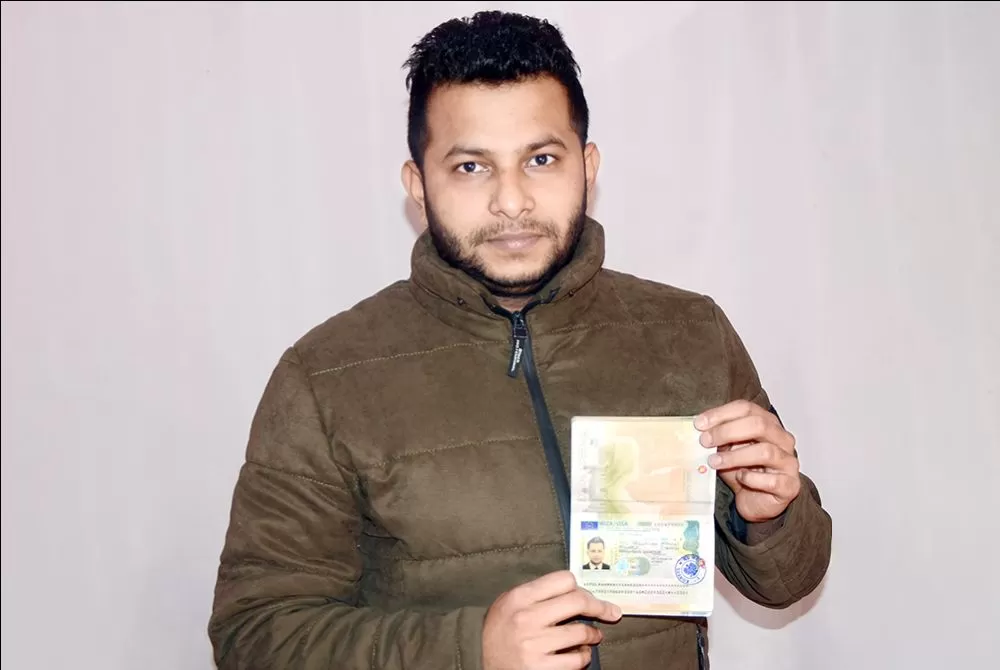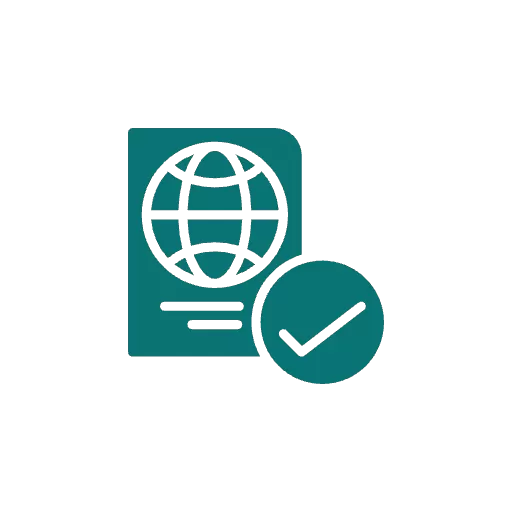- Home
- Work Permit
- Poland
We are a global platform connecting institutions, employers, students, job seekers, and recruitment partners.
Join Us Today:
Get in touch with us!
Poland Work Visa & Work Permit: The Ultimate Guide for Foreigners
Poland is one of the top European destinations for international workers in 2025. The country's booming economy, growing industries, and straightforward visa procedures make it an ideal choice for both skilled and unskilled workers.
Foreign nationals from countries such as India, Nepal, Bangladesh, the Philippines, Sri Lanka, Vietnam, and several African nations are increasingly choosing Poland for its legal employment opportunities, stable income, and affordable lifestyle.
This complete guide covers everything you need to know about the Polish Work Visa and Work Permit, including types, eligibility, process, costs, documents, and the top jobs available for foreigners.
Why Work in Poland?
1. A Growing Economy
Poland ranks among the fastest-growing economies in the European Union. With consistent GDP growth and low unemployment, it offers excellent prospects across sectors such as construction, logistics, manufacturing, IT, and healthcare.
2. High Demand for Foreign Workers
Due to demographic changes and skill shortages, Poland is recruiting thousands of foreign workers annually. Employers are especially interested in hiring candidates from Asian and African countries to fill labour gaps in logistics, agriculture, hospitality, and healthcare.
3. Legal Pathway to the EU
The Polish Work Visa offers a legal way to live and work within the EU. Once you have a Temporary Residence Card (TRC), you can travel freely across the Schengen Zone and build your career in Europe.
4. Affordable Living Costs
Compared to Western Europe, Poland's cost of living is significantly lower, allowing foreign workers to save a large portion of their income while enjoying a good quality of life.
5. Gateway to Permanent Residence
After five years of legal residence and employment, you can apply for Permanent Residence (PR) and, later, for EU citizenship, gaining long-term stability and benefits for your family.
6. Transparent and Efficient Process
Poland's immigration system is well-organised and supported by digital systems. Agencies like M2S Group Sp. z o.o. Assist both employers and employees through every stage, ensuring compliance and faster results.
7. Safe and Welcoming Society
Poland is known for its safety, hospitality, and growing multicultural population. English is widely understood, particularly in workplaces with foreign employees.
What is a Polish Work Permit?
A Polish Work Permit is a government-issued authorisation that authorises a non-EU citizen to work legally for a specific employer in Poland. It defines your job title, employer name, location, and employment duration.
Without a valid work permit, non-EU nationals are not eligible to apply for a work visa or commence employment in Poland.
Who Issues the Work Permit
The Voivodeship Office (Urząd Wojewódzki) in Poland issues work permits based on the employer's registered address.
Validity
Work permits are generally valid for up to one year, but can be extended depending on the employment contract and employer requirements.
Types of Polish Work Permits
|
Type |
Purpose |
Validity |
Ideal For |
|---|---|---|---|
|
Type A |
For foreigners employed by a Polish-registered company |
Up to 1 year |
Most foreign workers |
|
Type B |
For company board members or directors |
Up to 2 years |
Managers and executives |
|
Type C |
For employees delegated to work in Poland by a foreign employer |
30 days – 1 year |
International company staff |
|
Type D |
For foreigners performing temporary services in Poland |
Up to 6 months |
Contractors, consultants |
|
Type E |
For exceptional or rare employment situations |
iable |
Specialized roles |
|
Type S (Seasonal) |
For seasonal employment, such as agriculture or hospitality |
Up to 9 months per year |
Farm and hotel workers |
Poland Work Visa (Type D National Visa)
The Poland Type D Work Visa is a long-stay visa that allows non-EU citizens to live and work legally in Poland. It is linked directly to your work permit.
Eligibility
To qualify for a Poland Work Visa, you must:
- Hold a valid work permit issued by a Polish employer.
- Possess a signed employment contract or job offer.
- Hold a valid passport with at least 12 months of validity.
- Provide proof of accommodation and sufficient financial means.
- Hold valid travel or health insurance.
- Present a clean criminal record (if required by the embassy).
Visa Duration
Usually valid for up to one year, extendable upon renewing your work permit or obtaining a Temporary Residence Card (TRC).
Documents Required for a Polish Work Visa
From the Employer
- Completed work permit application form.
- Company registration documents (KRS, NIP, REGON).
- Employment contract or job offer.
- Proof of payment for government fees.
- Labour market test (if applicable).
- Proof of the company's financial capability.
From the Employee
- Valid passport (minimum 12 months).
- Two passport-size photographs.
- Original work permit.
- Signed job offer or employment contract.
- Medical or travel insurance.
- Accommodation confirmation.
- Proof of financial means (bank statements or credit card limit).
- Clean criminal record certificate/legalised).
- Visa application form and payment receipt.
Step-by-Step Poland Work Permit Process
Step 1: Job Offer
The process begins when a registered employer in Poland offers you a job.
Step 2: Employer Applies for Work Permit
The employer applies to the Voivodeship Office, including the employment contract, company documents, and proof of payment of the fee.
Step 3: Work Permit Approval
The Voivode (regional governor) reviews the application and issues the work permit within 30 to 60 working days.
Step 4: Visa Application
With the approved permit, you can apply for a Type D National Work Visa at the Polish embassy or a visa application centre in your home country.
Step 5: Visa Processing
Processing takes into account the embassy's workload, the system's residual needs, and its analytics.
Step 6: Travel to Poland
Once your visa is approved, you can travel to Poland and begin working in accordance with the terms of your contract.
Step 7: Apply for Temporary Residence Card (TRC)
If your job continues beyond your visa validity, apply for a TRC (Karta Pobytu) to live and work legally for up to 3 years.
Processing Time for a Polish Work Permit and Visa
|
Stage |
Time Frame |
|---|---|
|
Work Permit Application |
30–60 working days |
|
Embassy Visa Processing |
15–30 working days |
|
Temporary Residence Card |
2–3 months after arrival |
|
Total Estimated Duration |
45–90 working days |
Work Permit and Visa Fees
|
Service |
Fee (PLN / €) |
Paid By |
|---|---|---|
|
Work Permit (up to 3 months) |
PLN 50 (€12) |
Employer |
|
Work Permit (over 3 months) |
PLN 100 (€23) |
Employer |
|
Delegated Work Permit |
PLN 200 (€46) |
Employer |
|
Seasonal Work Permit |
PLN 30 (€7) |
Employer |
|
Work Visa (Type D) |
€80–€100 |
Employee |
|
Embassy/VFS Fee |
€10–€20 |
Employee |
|
Temporary Residence Card |
PLN 440 (€100) |
Employee |
Additional Costs:
Medical insurance, document legalisation, and travel expenses.
Jobs in Poland for Foreigners
|
Industry |
Common Roles |
Average Monthly Salary (€) |
Work Permit Type |
|---|---|---|---|
|
Construction |
Bricklayers, Plumbers, Electricians, Welders |
1,200–1,900 |
A |
|
Logistics & Warehousing |
Forklift Operators, Pickers, Loaders |
1,200–1,800 |
A |
|
Transportation |
Truck Drivers (CE/Code 95) |
2,100–2,900 |
A |
|
Manufacturing |
Machine Operators, Technicians |
1,100–1,700 |
A |
|
Hospitality |
Servers, Cooks, Cleaners |
1,000–1,500 |
S / A |
|
Agriculture |
Farm Workers, Fruit Pickers |
950–1,300 |
S |
|
Healthcare |
Nurses, Caregivers, Physiotherapists |
1,800–3,500 |
A |
|
IT & Engineering |
Software Developers, System Analysts |
2,500–5,000 |
A / B |
Benefits of Working in Poland
- Legal employment under EU regulations.
- Safe and fair working conditions.
- Opportunity for family reunification.
- Pathway to permanent residence and citizenship.
- Access to social security (ZUS) and healthcare.
- Affordable cost of living with saving potential.
- Opportunity to travel across the Schengen Zone.
- High demand for international workers in multiple sectors.
Official Government Links
- Find Verified Job Offers: https://oferty.praca.gov.pl
- Work Permit Information: https://www.gov.pl/web/udsc-en/work
- Visa Application Details: https://www.gov.pl/web/diplomacy/visas
- Temporary Residence Card (TRC): https://www.gov.pl/web/udsc-en/temporary-residence-permit
Poland Immigration & Work Permit Services | Moving2Europe.eu
Poland has become one of Europe’s fastest-growing work and immigration destinations—offering strong job opportunities, competitive salaries, a stable economy and a highly employer-friendly labour market. However, Polish immigration rules—including work permit types, employer sponsorship procedures, labour market steps, and strict document requirements—can feel overwhelming.
Moving2Europe.eu makes the entire Polish immigration and work permit process simple, structured and fully compliant for workers, families and employers worldwide.
Complete Poland Work Permit & Residence Solutions
We assist with all major Polish visa and residency categories, including:
- Poland Work Permit Type A
- Work Permit Type B, C, D, E
- Seasonal Work Permit (Type S)
- National D Visa (Work Visa)
- Temporary Residence Card (Karta Pobytu)
- Blue Card Poland
- Skilled Worker & Professional Visas
- Short-term & long-term employment visas
- Student, trainee & internship visa support
- Freelance, business & investment residence options (where applicable)
Whether you are an individual applicant or a company hiring non-EU workers, we manage the whole process with accuracy and transparency.
Poland Immigration Services for Individuals
1. Work Permit & Residency Processing
Expert assistance for:
- Work Permit Type A (employer-sponsored)
- Seasonal Work Permit (Type S)
- National D Visa for employment
- Temporary Residence Permit (TRC / Karta Pobytu)
- EU Blue Card for highly skilled professionals
- Permanent residence pathways for long-term stayers
2. Document Preparation & Embassy Support
End-to-end assistance, including:
- Customised document checklists
- Professional document review
- Legalization & sworn translations
- Visa application preparation
- Embassy / VFS appointment scheduling
- Interview readiness support
3. Arrival, Registration & Compliance
We guide you step-by-step:
- Entry & border procedures
- Biometric submission for TRC
- Address registration with the municipality
- Work registration with PUP/ZUS, where required
- Ongoing compliance and legal guidance
Poland Family & Dependent Visa Services
We help families relocate smoothly with:
- Spouse visas
- Child/dependent visas
- Family reunification applications
- Long-term stay and residence rights
- School documentation & relocation guidance
Your family’s comfort, safety and legal compliance remain our top priority.
Poland Immigration Solutions for Employers & Recruiters
Poland continues to face significant labour shortages in industries such as:
- Construction & engineering
- Hospitality & food service
- Logistics, transport & warehousing
- Manufacturing & production
- Agriculture & seasonal sectors
- Healthcare & nursing
- IT & digital technology
We support employers with:
- Full employer sponsorship assistance
- Labour market steps and documentation
- Work permit application processing for foreign staff
- Compliance with Polish immigration and labour rules
- Large-volume recruitment programs
- End-to-end mobility support for international teams
- Corporate relocation planning for executives
We ensure every candidate receives a valid Polish work permit properly, legally and on time.
Executive Mobility Services for Poland
Tailored solutions for executives, investors and senior professionals:
- Priority handling of cases
- Confidential case management
- Strategic mobility planning
- Fast-track file preparation
- Coordination with company HR, legal & compliance teams
Designed to support high-level professionals with speed, privacy and accuracy.
Digital Poland Immigration Tracking System
Moving2Europe.eu offers a modern digital immigration platform with:
- 24/7 case status updates
- Secure document uploads
- Automated reminders for upcoming steps
- Complete milestone tracking
- Compliance notifications
- Legal updates & immigration guides
Perfect for both individual applicants and HR teams managing multiple workers.
Why Choose Moving2Europe.eu for Poland Immigration?
✔ Specialists in all Polish work permit types
✔ Fast, compliant and error-free processing
✔ Dedicated case managers for every applicant
✔ Support for both employers and workers
✔ Transparent step-by-step guidance
✔ Global immigration network across 170+ countries
✔ Strong experience in Polish and EU immigration rules
✔ Technology-driven, client-friendly case management
We simplify complex processes so you can focus on your job, business, or relocation.
Start Your Poland Work Permit Process Today
Whether you’re applying on your own, relocating with your family, or hiring international workers, Moving2Europe.eu ensures a smooth, legal and professionally managed Poland immigration experience from start to finish.
Frequently Asked Questions (FAQs)
1. What are the main types of Polish work permits?
Poland offers Work Permit Types A–E, the Seasonal Permit (Type S), the National Visa D, and the Temporary Residence Card (TRC). These cover skilled, unskilled, seasonal, and long-term employment categories.
2. What is the Poland Work Permit Type A?
It is the most common permit for foreigners employed directly by a Polish company. The employer applies at the Voivodeship Office, and the worker uses it to obtain a Visa D.
3. What documents are required for a Polish work permit?
Passport, job contract, employer application, qualifications, CV, health insurance, and accommodation proof. Some voivodeships may require legalised or translated documents.
4. How long does it take to get a Polish work permit?
Typically 4–12 weeks, depending on the voivodeship and workload. Delays may occur due to missing documents or high application volumes.
5. Do I need a job offer to get a Polish work visa?
Yes, a signed job offer or contract is required for almost all work permit categories. Poland does not issue work visas without employer sponsorship.
6. What is the Polish National Visa Type D?
A long-stay visa allowing up to 365 days in Poland for work, study, or residence processing. It is usually issued in accordance with a valid work permit.
7. Can I apply for a Polish work permit from abroad?
Yes, the employer applies in Poland, and the applicant applies for the visa at the embassy. You don't need to visit Poland during processing.
8. Can employers sponsor foreign workers in Poland?
Yes, employers can legally hire non-EU nationals if salary, contract, and compliance rules are met. Sponsoring includes applying for a work permit and supporting visa documents.
9. What is the minimum salary required for a Polish work permit?
It must meet Poland’s legal minimum wage and industry standards. For most jobs, the range is €800 to €1,200 per month, depending on the region and sector.
10. Can students work in Poland?
Yes, international students with a valid TRC can work without a separate permit. Many part-time and seasonal opportunities are available for students.
11. What are the shortage occupations in Poland?
Sectors like logistics, drivers, construction, nursing, IT, hospitality, warehouse, and factory work. These roles have easier approval and faster hiring.
12. Can I bring my family to Poland on a work permit?
Yes, dependents can apply for a Temporary Residence Card after you start working. Family reunification rules allow spouses and children to stay long-term.
13. Do dependents have the right to work in Poland?
Dependents with a valid TRC can work without needing a separate permit. They enjoy almost the same labour rights as the principal applicant.
14. What is the Poland Blue Card?
It is a work-residence permit for highly skilled professionals with higher salary thresholds. Ideal for IT, engineering, medical, and specialised roles.
15. Can I change employers after receiving a work permit?
Yes, but the new employer must apply for a new permit or update your residence card. You cannot switch employers without official approval.
16. Do I need Polish language skills?
No, many employers accept English, especially in logistics and manufacturing. Some roles may require basic Polish for communication.
17. Is health insurance mandatory in Poland?
Yes, applicants must have valid public (ZUS) or private health insurance. Without insurance, visas and residence permits may be rejected.
18. What is the Seasonal Work Permit (Type S)?
A short-term permit valid up to 9 months for agriculture and hospitality jobs. It is suitable for unskilled workers with basic experience.
19. Can seasonal workers apply for long-term residency?
No, seasonal permits do not lead to TRC or PR. Workers must return home after contract completion.
20. How do I register my address in Poland?
Register at the local municipal office (zameldowanie) within a few days of arrival. This is mandatory for visa and TRC applications.
21. Can I apply for permanent residence in Poland?
Yes, usually after 5 years of continuous, legal residence. Employment, family, and business categories qualify.
22. Does Poland accept work permit applications from non-EU citizens?
Yes, Poland actively hires workers from Asia, Africa, and Eastern Europe. Demand is high in many low-skill and high-skill sectors.
23. What are Poland’s most in-demand jobs?
Drivers, warehouse, factory, agriculture, nursing, hospitality, construction, carpentry, and IT. Many employers hire urgently.
24. Is it challenging to get a job in Poland?
Jobs are available easily for both skilled and unskilled workers. Shortage sectors offer faster hiring and visa approval.
25. How long can I stay in Poland with a Type D visa?
Up to 365 days, depending on the work permit duration. The visa allows single or multiple entries.
26. Can I renew my Polish work permit?
Yes, work permits and TRC can be renewed if the employment continues. Renewal requires employer documents and updated contracts.
27. What is the Temporary Residence Card (TRC)?
A residence permit allowing long-term stay and work authorisation. Valid for 1–3 years and renewable.
28. Do I need biometrics for a Polish visa?
Yes, biometrics (fingerprints + photo) are required at VFS or the embassy. They are also retaken when collecting the TRC.
29. Can you apply for my employer?
Yes, employers submit all work permit applications at the voivodeship. Workers only apply for the visa at the embassy.
30. Is Poland part of the Schengen Area?
Yes, Poland is a Schengen member state. Visa D and TRC holders enjoy Schengen benefits.
31. Can I travel in Schengen with a Polish residence permit?
Yes, TRC holders can travel visa-free across Schengen countries. Tourist stays are allowed up to 90 days in 180 days.
32. What happens if my work permit is rejected?
Please feel free to appeal or reapply with corrected documents. Moving2Europe.eu provides complete resubmission and appeal support.
33. Does Poland offer visas for truck drivers?
Yes, Poland has a significant shortage of truck, bus, and delivery drivers. Visa processing is faster for applicants in shortage occupations.
34. Is Poland good for skilled migrant workers?
Yes, with strong economic growth, stable jobs, and affordable living. Many workers move from Poland to long-term EU opportunities.
35. Do I need translated documents?
Yes, most documents require a sworn translator's translation into Polish. Some also require legalisation or an apostille.
36. Can I work in Poland without qualifications?
Yes, sectors like warehouse, agriculture, hospitality, and factory work hire without formal education. I think basic experience is helpful.
37. What is the work permit processing time?
Usually 4–12 weeks, depending on the region. Warsaw, Kraków, and Gdańsk may take longer due to heavy application loads.
38. Can international nurses apply for work in Poland?
Yes, nursing and caregiving are high-demand sectors. Employers often assist with recognition and integration processes.
39. Are employers required to provide accommodation?
Not mandatory, but many employers offer free or subsidised housing. This is common for factory and seasonal workers.
40. What is the Labour Market Test?
A check to ensure no Polish/EU worker is available for the job. Not required for certain shortage occupations.
41. Can I start working while my permit is being processed?
No, you must wait for the work permit and visa approval. Working illegally can result in visa refusal.
42. What are the age requirements?
No official age limit, but applicants must be physically fit and suited for the job. Employers may prefer workers aged 20–55.
43. Can I convert a tourist visa to a work visa?
No, Poland does not allow tourist-to-work conversions. Processes must start from the home country.
44. Does Poland offer visas for unskilled workers?
Yes, many employer-sponsored roles exist in factories, agriculture, cleaning, and logistics. No high qualification is required.
45. Are biometric checks required on arrival?
Yes, biometrics are retaken during TRC issuance in Poland. This confirms identity and activates the residence card.
46. Does Poland have a remote work visa?
No official digital nomad visa, but freelancers may apply for business or special residence categories. Approval depends on income proof.
47. What are Poland’s highest-paying sectors?
IT, engineering, logistics, finance, healthcare, and manufacturing management. Skilled workers earn significantly more.
48. Does Moving2Europe.eu offer full work permit support?
Yes, including job matching, employer sponsorship, VFS guidance, documentation, visa filing, and TRC support.
49. Can I apply for long-term residence after working in Poland?
Yes, a continuous legal stay can lead to permanent residence and eventually citizenship. Work permits help build eligibility.
50. How can I start my Poland work visa application?
You can contact Moving2Europe.eu, submit your CV, and choose your job category. Our team handles the whole process from employer to visa.
Contact M2S Group Sp. z o.o. for Assistance
M2S Group Sp. z o.o. Provides comprehensive guidance on obtaining work permits, visas, and residence cards for Poland.
Our team assists with legal documentation, employer coordination, and embassy procedures for candidates from all nationalities.
Looking for inspiration
Global clients share how M2S Group helped them secure careers, work permits, and visas in Europe...
At M2S Group, we aim to help you become a true global citizen by providing exceptional support in your international career and immigration journey.
Read MoreOur Platform
We connect institutions, employers, students, job seekers, and recruitment partners worldwide.

Employer
Are you recruiting skilled workers from the CIS, African, Asian regions, or other EU countries to work in Poland, Hungary, Lithuania, Slovakia, Estonia, Germany, and other EU nations? Partner with Moving2Europe.eu for efficient and reliable recruitment solutions.

Job seekers
Are you looking to work in Poland, Hungary, Lithuania, Slovakia, Estonia, Germany, or other EU countries? Could you let Moving2Europe. Can you connect with top employers and help with recruitment?

Recruitment Agency
Do you recruit prospective students and workers eager to study or work in Poland, Hungary, Lithuania, Slovakia, Estonia, Germany, or other EU countries? Join Moving2Europe.eu as a trusted Recruitment Partner and grow your network globally.
Do you have any questions?
We are here to help you explore opportunities to work and live in Europe. Our experts are ready to assist you with questions about job searching, obtaining a visa, recognising qualifications, and learning a European language. To learn more about contacting us, please click on one of the icons in the bar below.









